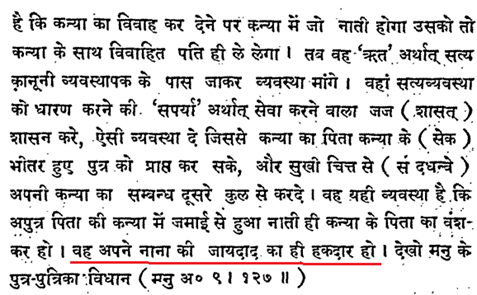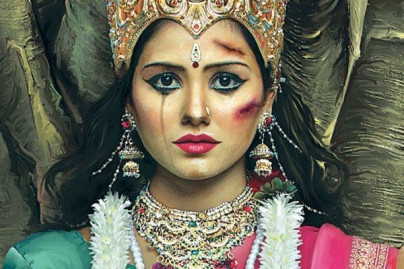No Inheritance for Woman in Vedas

A Short Analysis on Women’s Inheritance in Vedas
Written by Sulaiman Razvi
It was due to the influence of other religions like Islam that some Hindu revivalist found the need to reform Hindu society. Hindu scholars fail to furnish any Hindu text which entitles a woman to inherit her father’s property, this is because there isn’t a single authoritative text which allows a woman to inherit paternal property. It is mentioned in Vedas,
Krishna Yajur Veda 6.5.8.1 Women are powerless, have no inheritance, and speak more humbly than even a bad man.
It is mentioned in Baudhayana in the inheritance section,
Baudhayana Dharma Shastra 2.2.3.46 The Veda declares, ‘Therefore women are considered to be destitute of strength and of a portion.’
In the Rig Veda,
Rig Veda 3.31.2 ‘‘The son does not transfer paternal wealth to his sister. He makes her receptacle of the embryo of her husband. When parents procreate children of either sex, one (the male) becomes the performer of holy rites (he is the legal inheriter), the other (the female) is to be enriched with gifts.” Tr. Svami Satyaprakash Saraswati
Below is the Hindi translation by Shri Ram Sharma,

This verse is further elaborated by Yaska,
Nirukta 3.6 ‘Na Jamaye’ means not for the sister. Jamih (sister) is (so called because) others beget ‘Ja’, i.e. offspring, on her, or the word may be derived from (the root) jam, meaning to go : she has mostly to go (to the husband’s family). The legitimate, i.e. one’s own son, left, i.e. gave, wealth. He made her the place of depositing the seed of her husband, i.e. the man who accepts her hand. If the mothers have engendered Vahni, i. e. a son, and Avahni, i.e. a daughter, one of them, i.e. the son and the heir, becomes the procreator of children, and the other, i.e. the daughter, is brought up and given away (in marriage) to another person.
The verse speaks for itself. This is enough to prove whether women could inherit her paternal wealth or not. Svami Satya Prakash Saraswati wrote in the brackets of the verse that the son is the legal inheritor ” (he is the legal inheriter)” Below is the snapshot from his book

The Hindu law is governed by Mitakshara and Dayabhaga schools of law. In the Hindu Undivided Family (HUF) the head of the family is known as Karta. Usually Karta is a male member and only male members enjoy coparcener’s interest. After the death of the Karta the eldest son takes the property (as per Manu Smriti), although property can be divided in the presence of Karta as Maharishi Manu himself divided his property among his sons while he was alive.
Krishna Yajur Veda 3.1.9 Manu divided his property among his sons.
A daughter can inherit property only if she has no brother that too only if her father makes her the Appointed Daughter. If the daughter begets a Son then the son becomes the legal heir and is adopted by his maternal grandfather. Yaska states,
Nirukta 3.5 One should not marry a brotherless maiden, for his (the husband’s) son belongs to him (to the father of the girl). From this, the prohibition of marrying a brotherless maiden and the father’s right to appoint his daughter as a son are evident. When a father selects a husband for his unmarried daughter, he unites himself with a tranquil mind.
Pandit Jaydev Sharma (Arya Samaj) writes on Rig Veda 3.31.1
”The grandson shall be the legal heir of his grandfather’s property”

It is mentioned in Purana,
Bhagwad Puran 10.57.37 “Since Satrajit had no sons, his daughter’s sons should receive his inheritance. They should pay for memorial offerings of waler and pinda, clear their grandfather’s outstanding debts and keep the remainder of the inheritance for themselves.
It’s clear that Vedas does not give rights of inheritance to women, Vedas nor the Brahmanas enables the daughter to inherit property. Even an appointed daughter can’t hold her father’s property after she begets a son. Inheritance in Hinduism is the exclusive right of Sons only.

